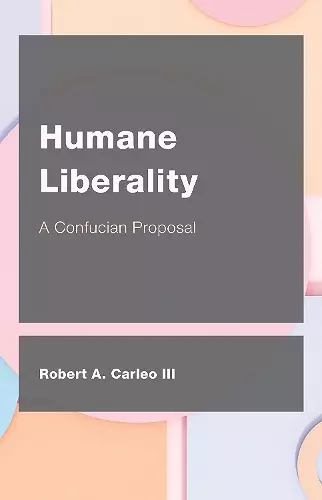Humane Liberality
A Confucian Proposal
Format:Hardback
Publisher:Bloomsbury Publishing PLC
Published:15th Oct '24
Currently unavailable, and unfortunately no date known when it will be back

This book offers a concrete humanist argument for endorsing rights and liberties via the Mencian virtue of humaneness. Analyzing the problems and possibilities of affirming freedom, equality, and pluralism through Confucianism, the book advocates a novel paradigm for political deliberation through consideration of people's diverse interests.
Can we endorse valuable rights and freedoms—the cherished forms of equality and liberty we might call liberality—without liberalism? This book outlines such a possibility. Humane liberality upholds and deliberates equality, freedom, and justice through the Mencian virtue of humaneness, based in care and compassion. In positing humaneness to be the first virtue of government, Mencius directs us to formulate policies that are responsive to and promote the wellbeing of the people understood in terms of their actual lived and felt experience—their feelings and their flourishing. Rights and freedoms can and should be affirmed in ways that facilitate that flourishing. This pushes against the usual approaches to valuing rights and liberties of both Confucians and liberals, who tend to reason from abstract first principles rather than through care for people and responsiveness to their actual wants and needs. In setting out this vision, Humane Liberality first critically analyzes the broader problems and possibilities of affirming freedom, equality, and pluralism through Confucianism. It then outlines and promotes an underappreciated concrete humanist account of Mencian morality and politics, which has been overshadowed by more metaphysical orthodox interpretations of Mencius. Concrete humanism insists we adjudicate what is right not through eternal abstractions but instead through situated assessment of human emotions. In this way, humaneness offers a unique and uniquely compelling approach to reasoning about rights and liberties, and humane liberality recasts how we understand and practice Confucian values, liberal principles, and the promise and potential of incorporating the two.
Advancing Confucian liberality on the basis of Mencius’ concept of humaneness, Carleo demonstrates how rights and liberties can be grounded seamlessly on Confucian philosophy. Thoroughly researched, well organized, and clearly articulated, this book makes an important move in constructing contemporary Confucianism. -- Chenyang Li, author of Reshaping Confucianism: A Progressive Inquiry
Humane Liberality powerfully illustrates the potential of modern Confucian theorizing. Carleo is broadly sympathetic to the means and ends of liberalism but not to its justification. His deep engagement with historical and contemporary Chinese philosophers enables him to articulate a fresh and compelling vision of “liberality” rooted in our caring humanity. -- Stephen C. Angle, Wesleyan University
In Humane Liberality: A Confucian Proposal, philosopher Robert Carleo advocates for a compatibilist, practicable, and meliorative "humane liberality" by tempering the abstract, foundationalist, and universalistic tendencies of much liberal theorizing with the concrete, empirical, and compassionate values advocated by the Confucian avatars, Mencius, Dai Zhen, and Li Zehou. For Carleo, it is a Confucian and liberal hybridity rather than choosing between them that allows for an empathetic negotiation of the moral and political consensus necessary for an inclusive pluralism. -- Roger T. Ames, Peking University
One reason for liberal democracy being under attack is the poverty of its discourse. Robert A. Carleo III’s Humane Liberality: A Confucian Proposal is a critical and constructive engagement with the liberal part of liberal democracy that will enrich the language of liberalism. Carleo shows the contemporary relevance of Confucianism by teasing out the hidden messages in the Confucian classic, the Mencius. -- Tongdong Bai, Fudan University
ISBN: 9781538174944
Dimensions: 236mm x 158mm x 21mm
Weight: 481g
206 pages